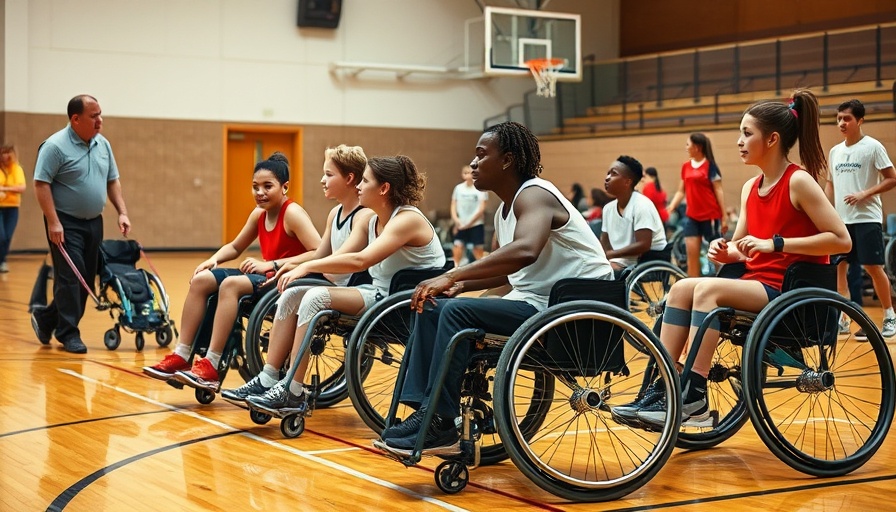
Understanding the Importance of Resilience in Children
Resilience plays a pivotal role in how children confront and overcome challenges. For children with physical limitations, these challenges can often feel overwhelming. Resilience is not merely the ability to bounce back from setbacks; it's about fostering a mindset that embraces effort and learning—even in the face of adversity. When kids learn to navigate obstacles through resilience, they develop a greater sense of self-worth and become better equipped to face future challenges.
Defining Self-Advocacy: A Skill for Life
Self-advocacy is the cornerstone of independence for children, especially those with disabilities. It's vital that they learn to articulate their needs and preferences, whether in educational settings or daily life. Teaching self-advocacy starts with creating an environment where children feel safe and encouraged to express themselves. Adults can support this process by ensuring children understand their rights and helping them practice communicating their needs effectively.
Building Resilience: Strategies for Parents and Educators
For parents and educators, the journey of fostering resilience begins with modeling positive behaviors. This means showing children that making mistakes is okay and that each challenge is an opportunity to learn. To highlight this, focus on children’s existing strengths while gradually introducing them to new skills. Incorporating play and everyday activities into resilience-building exercises can also reinforce positive coping mechanisms.
Creating a Strengths Map: Visualizing Abilities
One innovative approach to encourage resilience is creating a strengths map. This visual tool can help children identify their capabilities, promoting a clear understanding of their abilities while acknowledging areas for growth. By collaborating on a strengths map, children can visualize their potential, making it a tangible part of their educational and personal journey. Use colors, drawings, or stickers to make it engaging—this not only makes the process fun but also empowers them to see their own progress.
Encouraging Growth Through Mindset
The language we use around challenges greatly influences how children perceive and respond to difficult situations. By fostering a growth mindset, parents can encourage kids to view obstacles as temporary stop signs rather than roadblocks. This type of thinking opens the door to experimentation and resilience. Discuss specific instances where challenges led to learning opportunities, reinforcing the idea that setbacks teach valuable lessons.
Practical Tips for Developing Self-Advocacy
There are concrete steps adults can take to help children develop effective self-advocacy skills. Begin by encouraging discussions about their needs and preferences. Role-playing scenarios where they must advocate for themselves, whether it’s in a doctor’s office or a classroom, can build their confidence. Plus, encouraging children to ask questions helps them become more informed and engaged in their own care and education. This engagement not only develops their self-advocacy skills but also instills a deeper understanding of their unique challenges and strengths.
Community Support: A Pillar of Resilience
Engaging with community resources can significantly bolster resilience in children with physical limitations. Local support groups, recreational programs designed for those with disabilities, and mentorship initiatives create safe spaces for children to connect with peers facing similar challenges. Communities that foster inclusivity allow children to thrive in environments where they feel valued and understood, which can be incredibly empowering.
The Long-Term Benefits of Resilience and Self-Advocacy
As children with physical limitations grow and learn, the skills of resilience and self-advocacy equip them for a more independent future. These children come to understand their rights and role in society, navigating adulthood with confidence and grace. Building these attributes doesn't just prepare them for academic and personal success; it empowers them to contribute positively to their communities and advocate for themselves and others around them.
Conclusion: The Journey Ahead
Fostering resilience and self-advocacy in children with physical limitations is a multi-faceted journey that involves community support, informed parenting, and continuous learning. By focusing on strengths, encouraging growth, and instilling the power of self-advocacy, we prepare these children to navigate life’s challenges with confidence. As we reflect on our roles as parents, educators, and community members, let’s commit to creating environments where our children can flourish. Take the first step by engaging in conversations about resilience and self-advocacy with the children in your life today!
 Add Row
Add Row  Add
Add 




Write A Comment